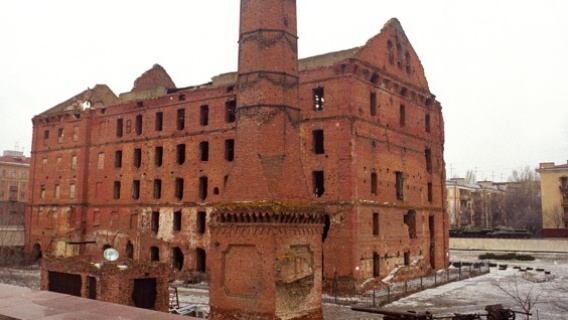
The ruins of Stalingrad
70 years ago, on 30 January 1943, as Soviet troops closed in on the centre of Stalingrad, Gerhard Hindenlang, a German battalion commander, received surprising news from Hitler’s HQ by radio. The overall commander of the German 6th Army in Stalingrad, General Friedrich Paulus had just been promoted to Field Marshal. Everyone present knew what this meant. German Field Marshals were not supposed to be captured by the enemy. It was a sign that Hitler wanted Paulus to commit suicide.
Hindenlang, who was interviewed for my TV series ‘War of the Century’ back in 1999, took the news to Paulus – telling him not just of his promotion, but that the situation militarily in the city was hopeless for the Germans. Paulus asked Hindenlang ‘what do you think of suicide?’ And Hindenlang replied: ‘Field Marshal, I lead troops and I will do so right until the last moment. I will go and become a prisoner of war if needs be, but you – you haven’t got any forces any more. ‘ And Paulus replied, ‘Hindenlang, I’m a Christian. I refuse to commit suicide.’
Hitler was not just outraged when he heard that Paulus had allowed himself to be captured alive – he was mystified. ‘What does that mean ‘life?’ he raged at his military HQ on 1 February 1943, ‘the individual has to die. What remains alive beyond the individual is the people. But how can one fear this moment – through which one (can free) oneself from misery?’
Instead of entering into ‘national immortality’ Paulus, Hitler said, had ‘preferred’ to go to Moscow, where ‘rats will eat’ him in the Lubyanka prison.
‘It hurts me so much’ said Hitler ‘because the heroism of so many soldiers is destroyed by a single, spineless weakling…’
A number of German officers in Stalingrad also thought Paulus should have committed suicide. Joachim Stempel, then a young officer, had witnessed a previous conversation between his own father, a senior commander at Stalingrad, and Paulus in which he believed Paulus had been calling on senior officers to kill themselves in the event that Stalingrad fell to the Red Army. And, after this conversation, Stempel’s own father had killed himself.
But after Stempel heard that Paulus had been captured alive he ‘mistrusted everything. Because I thought, well, what is the word of a superior officer worth? If my father had been uncertain in any way, he might have thought, well, OK, if Paulus, as commander-in-chief survives and is taken prisoner, why, should I, a divisional commander, not be taken captive as well?’
I’ve thought about these stories a lot since I first worked with this material fourteen years ago and visited Stalingrad (today called Volgograd) myself. Should Paulus have killed himself? Is it ever right to commit suicide for ‘honour’? I met plenty of Japanese veterans who believe it can be absolutely the right thing to do.
I’ve thought about it a lot, and I still don’t know…
 Twitter
Twitter






